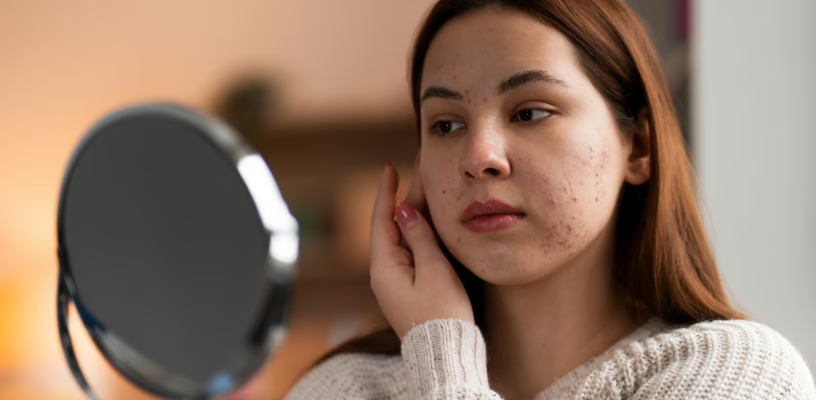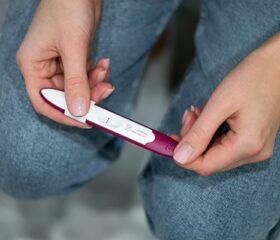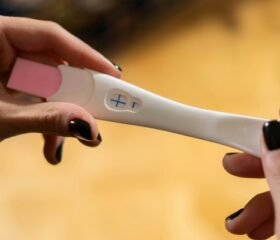Pregnancy Acne: Causes, Prevention, & Treatment
Pregnancy brings a lot of changes to your skin, and acne is often one of them.

Pregnancy acne is any form of acne that shows up when you’re pregnant, and unfortunately, many moms-to-be experience it.
You might have pregnancy acne even if you’ve always had clear skin. If you have existing acne, it might also get worse when you’re pregnant. 1
Read on to learn what exactly pregnancy acne is, what factors trigger it, how you can treat it, and when it will go away.
When and where does pregnancy acne appear?
While acne can appear at any point during pregnancy, it often crops up during the first trimester when your hormone levels peak, as well as the third trimester when the sebaceous glands (oil glands in the skin) are at their most active. 2
You can get pregnancy acne on any part of your body, including your face, neck, chest, and back. You can have all kinds of acne, including: 3
- Whiteheads and blackheads
- Papules (red bumps) and pustules (red bumps with pus)
- Nodules (firm, painful lumps)
- Cysts
You can’t use pregnancy acne to predict your baby’s sex
You may have heard old wives’ tales that the strength or type of your pregnancy symptoms may be signs of having a boy or a girl. Allegedly, getting bad acne means you’re having a girl. However, there’s no scientific evidence that links pregnancy acne to either sex. Your genetics and random chance determine your baby’s sex, not your skin condition.
What causes pregnancy acne?
The main trigger for acne is hormonal changes. 4 As you know, your hormone levels increase a lot when you’re pregnant. While these hormones actually improve the skin condition of some moms-to-be, for others, they cause annoying acne breakouts. 5
This happens because your increase in hormones—particularly the androgen hormones—can make your sebaceous glands produce more of an oily substance called sebum. 6
Too much sebum and dead skin cells may plug your hair follicles, causing bacteria to grow in them. You may then get acne. 3
How can you prevent pregnancy acne?
While you might not be able to totally prevent pregnancy acne, try out these methods to take care of your skin during pregnancy:
Keep your skin clean (but make sure to clean it gently)
Try to touch your face as little as possible. People’s hands carry a lot of bacteria, and you don’t want to spread it all over your face.
You can also keep acne at bay by washing your hair regularly, changing your pillowcases frequently, and always removing your makeup before going to bed. 7
While you should keep your skin clean, do so gently. Scrubbing your face very hard won’t make it meaningfully cleaner, but it could irritate it. Use a mild, soap-free cleanser to gently wash your face twice a day, in the morning and at night.
Use the right products
Comedogenic ingredients can clog your pores. When shopping for makeup, sunscreen, and other skincare products, check if they have a “non-comedogenic” or “water-based” label before buying them. 87
It’s important to moisturize, even if you have oily skin. If you don’t moisturize, your pores may become clogged with dry flakes of skin. You can use oil-free moisturizer to keep hydrated without clogging your pores.
Stay hydrated and eat well
If you often forget to drink water throughout the day, set alarms to remind yourself and keep a log of how much you’re drinking in your journal or pregnancy tracker app. Drinking water is one of the simplest yet most effective ways to keep your skin hydrated.
As for your pregnancy diet, watch out for high-glycemic foods, such as white bread, cornflakes, pastries, and sugary drinks. These increase your blood sugar quickly, which can trigger acne. It’ll be good for your skin if you stick to low-glycemic food like fresh veggies, fruits, beans, and steel-cut oats. 9
Reduce stress
Stress can have lots of negative impacts on your pregnancy, including making your acne worse. 10
While limiting stress is easier said than done, especially when you’re pregnant and juggling lots of responsibilities, try to relax as much as you can. You might find that activities like light exercises, yoga, or meditation help.
If you really want a treat, you could opt for a relaxing prenatal massage to ease your stress.
What acne products can you use during pregnancy?
According to the American College of Obstetricians and Gynecologists (ACOG), pregnant women can use over-the-counter acne products that contain the following ingredients in moderation: 1
- Topical benzoyl peroxide
- Topical salicylic acid
- Azelaic acid
- Glycolic acid
Although the ACOG approves these ingredients, it’s still a good idea to talk to your doctor before using them. After all, your doctor has a better idea of your specific pregnancy and health condition.
What products and medications aren’t safe for pregnancy acne?
You need to be careful about treating acne when you’re pregnant. Some common acne medications that non-pregnant people can use may be harmful to your developing baby.
For example, medications that block certain hormones are effective acne treatments, but they may increase the risk of your baby having birth defects. You should also watch out for: 1
- Isotretinoin: A type of vitamin A, this drug puts your baby at a high risk of severe birth defects. It can seriously damage his intellect, heart, brain, and other physical developments.
- Topical retinoids: These drugs are also a type of vitamin A. Though the amount of medication absorbed by your skin is quite low, you should still stay away from it.
- Oral tetracycline: This antibiotic can affect your baby’s tooth coloration and bone growth.
To reiterate, always check with your doctor if you’re unsure whether any medications you’re thinking of taking are safe during pregnancy or not.
When will your pregnancy acne go away?
Your acne will usually get better shortly after you give birth, as your hormone levels gradually return to normal. 11 However, it may take a few weeks or even months for your skin to completely clear.
In some cases, you might see new acne breakouts after delivery due to postpartum hormonal fluctuations, sleep deprivation, stress, or a combination of all three. 12
You can clear your skin quicker by maintaining good skincare habits. If you’re not breastfeeding, ask your doctor if you can start using some of the acne treatments that were off-limits during pregnancy.
Final thoughts
Acne is annoying whether you’re pregnant or not. Luckily, it won’t last forever. Your skin will be back to normal before you know it.
In the meantime, continue to look after your skin with healthy skincare routines. With the right approach, you can keep those annoying spots under control and enjoy your pregnancy glow!
Article Sources
- American College of Obstetricians and Gynecologists. "Skin Conditions During Pregnancy" Retrieved July 7, 2025.
- MedlinePlus. "Pregnancy test" Retrieved July 7, 2025.
- University of Rochester Medical Center. "Acne" Retrieved July 7, 2025.
- MedlinePlus. "Acne" Retrieved July 7, 2025.
- Office on Women's Health. "Acne" Retrieved July 7, 2025.
- Harvard Health Publishing. "Acne" Retrieved July 7, 2025.
- MedlinePlus. "Acne - self-care" Retrieved July 7, 2025.
- Lake County, Indiana . "Acne: Understanding and Managing a Common Pubertal Skin Condition" Retrieved July 7, 2025.
- American Academy of Dermatology Association. "Can the right diet get rid of acne?" Retrieved July 7, 2025.
- MedlinePlus. "Acne Also called: Pimples, Zits" Retrieved July 7, 2025.
- Johns Hopkins Medicine. "Pregnancy and Skin Changes" Retrieved July 7, 2025.
- UNM Health System. "Pregnancy Acne: Top 3 Questions, Answered" Retrieved July 7, 2025.







